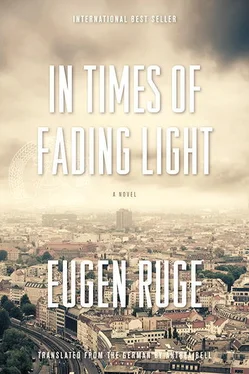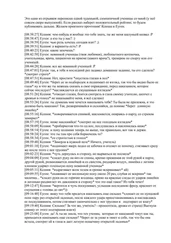Only at a late stage, when most of the exiles were back in Germany, had Wilhelm begun working for the Demokratische Post, but although he had put “manager of the Demokratische Post ” in his CV as his last position (and had described his job with the diamond dealer as “running freight services for the firm of Eder”), Dretzky must know that drawing up the balance sheet of donations for the Demokratische Post was not remotely comparable with the administration of an entire academy.
“Then now I’m your superior, so to speak,” said Wilhelm, taking a cigarette out of his pack.
“Hardly,” said Charlotte.
What went on in that head of his?
The prospect of going back had been held out to them several times already, but in the end something had always happened to prevent it. The first stumbling block had been over getting a transit visa for the United States. Then there were no funds available, because other comrades were more important. Then the Soviet consulate claimed to have no papers for them. And finally they were told that as they had repeatedly failed to make use of a permit to enter the country, they must now wait patiently.
This time, however, it seemed to be different. They really were given entry visas at the consulate. They also got direct passage by ship, even at a discount. In addition, Wilhelm’s ticket (why only Wilhelm’s?) was paid for out of Party funds—although by now they had enough money to pay for the crossing themselves.
Charlotte began winding down their household, terminated agreements, and sold the Queen of the Night back to the flower shop at a loss. There was an astonishing amount to be done, and only now did she realize how far she had been drawn into daily life here; every book, every shell, every figurine, as she decided whether to pack these things carefully in newspaper or throw them away, was linked in her memory with a part of her life that was now coming to an end. But at the same time as she assessed the usefulness of everything and anything in their new life, an image of that new life also began to form in her mind.
They bought five large cabin trunks, converted part of their small fortune into silver jewelry, and with the rest of it bought things that, they assumed, would be in short supply in postwar Germany, for instance, a Swiss portable typewriter (although it lacked the German double “s” symbol ß, which the Swiss didn’t use), two sets of very practical hard plastic crockery, a toaster, a number of cotton tablecloths printed with Indian patterns, fifty cans of Nescafé, also a very practical purchase; five hundred cigarettes; and a considerable number of new clothes, which, they thought, would suit both the German climate and their new social status. Instead of buying pale, lightweight summer frocks, Charlotte tried on blouses buttoning up to the neck, and sober skirt suits in various shades of gray; she got a permanent wave for her hair, and bought a plain but elegant pair of glasses, with narrow black-rimmed frames that gave her a convincing look of severity when she tried out the stern glance of the director of an institute in front of the mirror.
And so, still in her Mexican clothes but with new glasses and a new hairstyle, she met Adrian once more, one last time. They went, as so often, to a little restaurant in Tacubaya. Its one disadvantage was that it stood close to the Soviet consulate. Adrian ordered two glasses of white wine and chiles en nogada, and before their food arrived he asked Charlotte whether she knew that the Czech politician Slánský had been condemned to death.
“Why do you say that?” she asked.
Instead of replying, Adrian amplified his statement. “Along with ten others—for being part of a Zionist conspiracy.” He put a copy of the Herald Tribune down on the table. “Read that,” he said.
But Charlotte didn’t want to read it.
“It proves,” said Adrian, tapping the newspaper with his forefinger, “that nothing has changed in the slightest.”
“Could you please keep your voice down?” said Charlotte.
“Ah, you see,” said Adrian. “You’re scared already. What’s it going be like back there?”
Their food came, but Charlotte didn’t want to eat. For a while they both sat looking at their stuffed chili peppers. Then Adrian said, “Communism, Charlotte, is like the religion of the ancient Aztecs. It devours blood.”
Charlotte picked up her purse and ran out into the street.
Five days later they boarded the ship back to Europe. At the moment when its moorings were cast off and the deck beneath their feet began to sway slightly, maybe by only a millimeter, her knees felt weak, and she had to cling to the rail with all her might. After a minute the fit of faintness passed over, unnoticed by Wilhelm.
The coast disappeared in the mist, the ship turned toward the ocean and began its voyage, leaving a straight trail over the water in its wake. The wind freshened, on deck the shrouds hummed, and soon they were surrounded by endless gray reaching to the horizon in all directions.
The days were long, the nights even longer. Charlotte slept badly, kept dreaming the same dream, in which Adrian led her through a kind of underground museum, and when she woke she couldn’t get back to sleep. She lay in the dark for hours, feeling the pitching and rolling of the ship, feeling the hull quiver under gusts of wind. Slánský and ten others, Adrian had said. Why hadn’t she at least asked their names? Questions. What was Kurt doing in the Urals? Why, even all these years later, couldn’t the Red Cross find Werner? She wasn’t a good comrade. If she were honest with herself, she was always infringing Party discipline in her mind. And her body had almost done the same.
By day she deferred to Wilhelm and tried to sort out her head. What would she be today, she asked herself, but for the Party? She had learned invisible mending and ironing at domestic science college. To this day she would still be doing invisible mending and ironing for Senior Teacher Umnitzer, who cheated on her with his girl students; to this day she would still be putting up with her mother-in-law’s condescending tone, and getting cross about Frau Paschke using her washing line—if the Communist Party hadn’t come into her life along with Wilhelm.
In the Communist Party, she found respect and appreciation for the first time. Only the Communists, whom she had originally taken for bandits of some kind (as a child she always thought that Communists came into houses and pulled the sheets off neatly made beds, because her mother used to say they were opposed to good order)—only the Communists had seen her talents, had encouraged her to study foreign languages, had given her political tasks, and while her brother, Carl-Gustav, for whose art studies her mother had saved ferociously—to this day Charlotte remembered, bitterly, how she was told to watch the whistling kettle so as to save gas, and how her mother used to hit her on the back of the head with the breadboard if she forgot to turn the whistling kettle off at the right time, which was just before it whistled—while Carl-Gustav, then, had failed as an artist and immersed himself in the gay scene of Berlin, she, who had spent only four terms at domestic science college, was now on her way back to Germany to be head of the Institute for Languages and Literature, and the only thing she regretted was that her mother wasn’t around to know about this triumph, that she couldn’t send her mother a succinct note on a letterhead saying it was from Charlotte Powileit, Institute Director.
But then night fell again. The hull of the ship plowed through the darkness, and no sooner had Charlotte fallen asleep than Adrian was there, leading her through winding underground passages, and something bad was waiting for her at the end of them… she was awoken by her own scream.
Читать дальше












